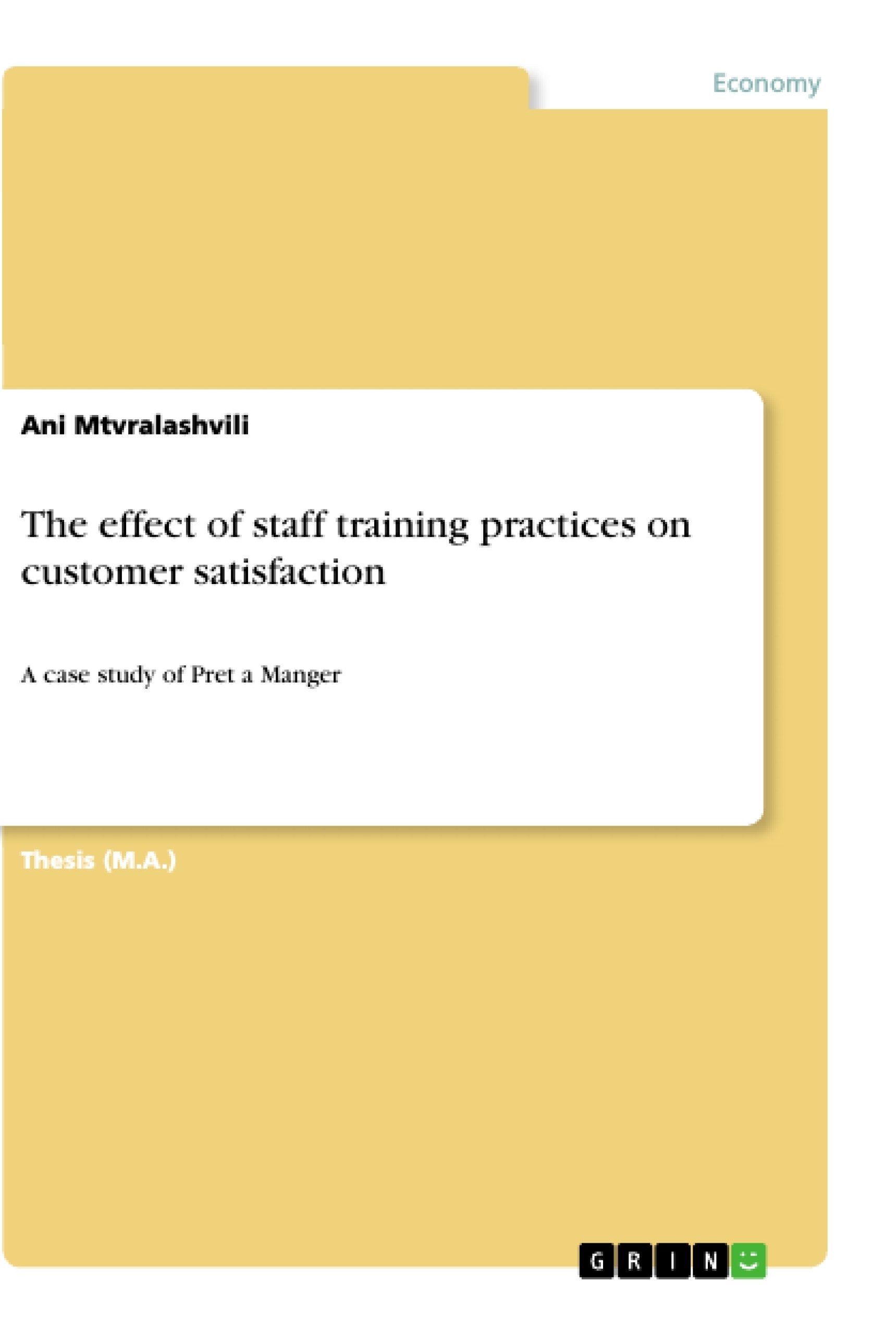In response to an increasingly competitive marketplace, growing research attention is being devoted to factors that contribute to desired consumer satisfaction (CS). Some researchers argue that employee training has more positive effect on CS rather than other human resource practices. Hence, as lack of research has been done regarding the effect of staff training practices on customer satisfaction, this study may be beneficial and can contribute to the literature where the interaction between staff training and customer satisfaction has not been obviously determined.
As it was identified, the company like Pret A Manger is highly focused on employee training, because it is believed that it helps to achieve the highest levels of satisfied consumers. Subsequently, organisations have to consider the effectiveness of employee training as a strong contributor to attaining organisational goals. This investigation will determine the link and the influence of staff training practices on customer satisfaction in order to fill the gap in the literature.
Inhaltsverzeichnis (Table of Contents)
- CHAPTER 1 INTRODUCTION
- 1.1. Introduction
- 1.2. Research background
- 1.3. Academic position
- 1.4. Research methodology
- 1.5. Context: Pret A Manger
- 1.6. Research aims and objectives
- 1.7. Research layout
- 1.8. Conclusion
- CHAPTER 2 LITERATURE REVIEW
- 2.1. Introduction
- 2.2. Research area of Human Resource Management
- 2.3. Review Staff training practices within HRM
- 2.4. Customer satisfaction
- 2.5. Linking staff training practices to customer satisfaction
- 2.6. Research done on staff training practices and customer satisfaction and the research question
- 2.7. Scholarly Research: staff training and customer satisfaction
- 2.7.1. Factors for evaluating customer satisfaction
- 2.7.1.1. Customer needs and wants
- 2.7.1.2. Customer expectations
- 2.7.1.3. Customer repeat purchase intention
- 2.7.2. Theories of staff training practices
- 2.7.2.1 Scenistic method of staff training
- 2.7.2.2. Constructivism learning theory
- 2.7.3. Models of staff training practices
- 2.7.3.1. Transitional model of staff training
- 2.7.4. Factors of staff training practices
- 2.7.4.1. Training need
- The role of staff training practices within Human Resource Management (HRM)
- The impact of staff training practices on customer satisfaction
- Factors influencing customer satisfaction, including needs, expectations, and repeat purchase intentions
- Theories and models of staff training practices, such as the Scenistic method and Constructivism learning theory
- Key elements of staff training practices, including training needs and evaluation methods
Zielsetzung und Themenschwerpunkte (Objectives and Key Themes)
This research aims to investigate the impact of staff training practices on customer satisfaction, utilizing Pret A Manger as a case study. The methodology employs qualitative research with semi-structured interviews conducted with senior management. Thematic analysis is applied to the collected data.
Zusammenfassung der Kapitel (Chapter Summaries)
Chapter 1 introduces the research topic, providing background information, outlining the research methodology, and presenting the research aims and objectives. It also defines the context of the case study, focusing on Pret A Manger.
Chapter 2 delves into a comprehensive literature review, examining the research area of Human Resource Management (HRM), specifically focusing on staff training practices and their connection to customer satisfaction. It explores various factors influencing customer satisfaction, including needs, expectations, and repeat purchase intentions. The chapter also discusses theories and models of staff training practices, highlighting the Scenistic method and Constructivism learning theory. Furthermore, it identifies key elements of staff training practices, including training needs and evaluation methods.
Schlüsselwörter (Keywords)
The research centers around the core concepts of staff training practices, customer satisfaction, qualitative research, thematic analysis, Human Resource Management (HRM), customer needs, customer expectations, repeat purchase intention, Scenistic method, Constructivism learning theory, and training needs.
- Quote paper
- Ani Mtvralashvili (Author), 2017, The effect of staff training practices on customer satisfaction, Munich, GRIN Verlag, https://www.grin.com/document/464049




